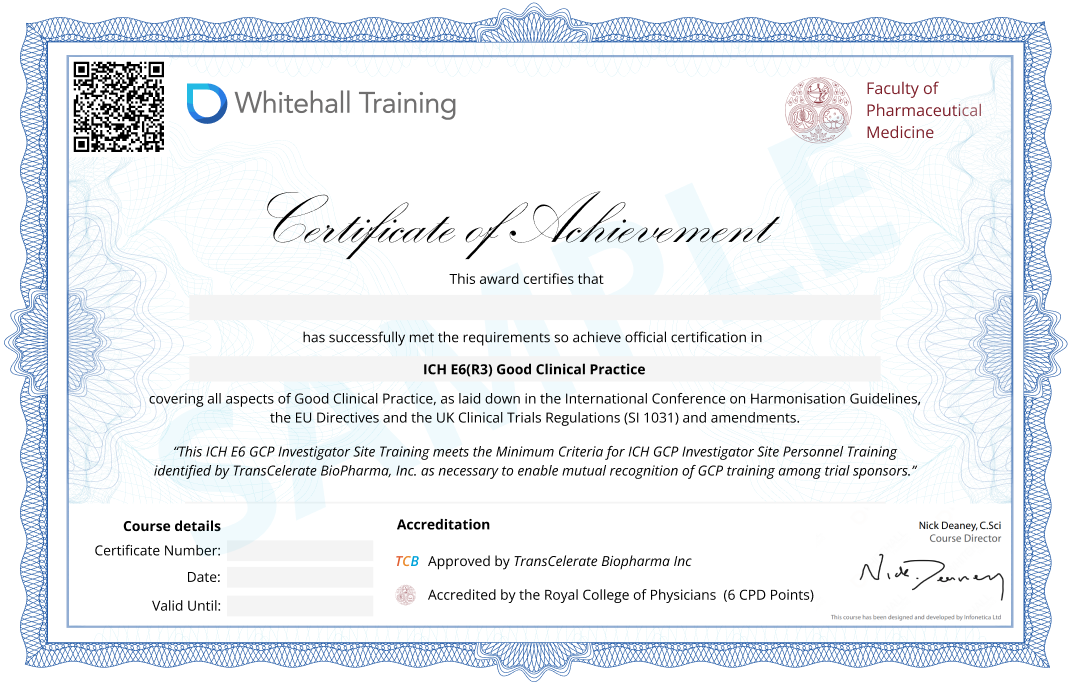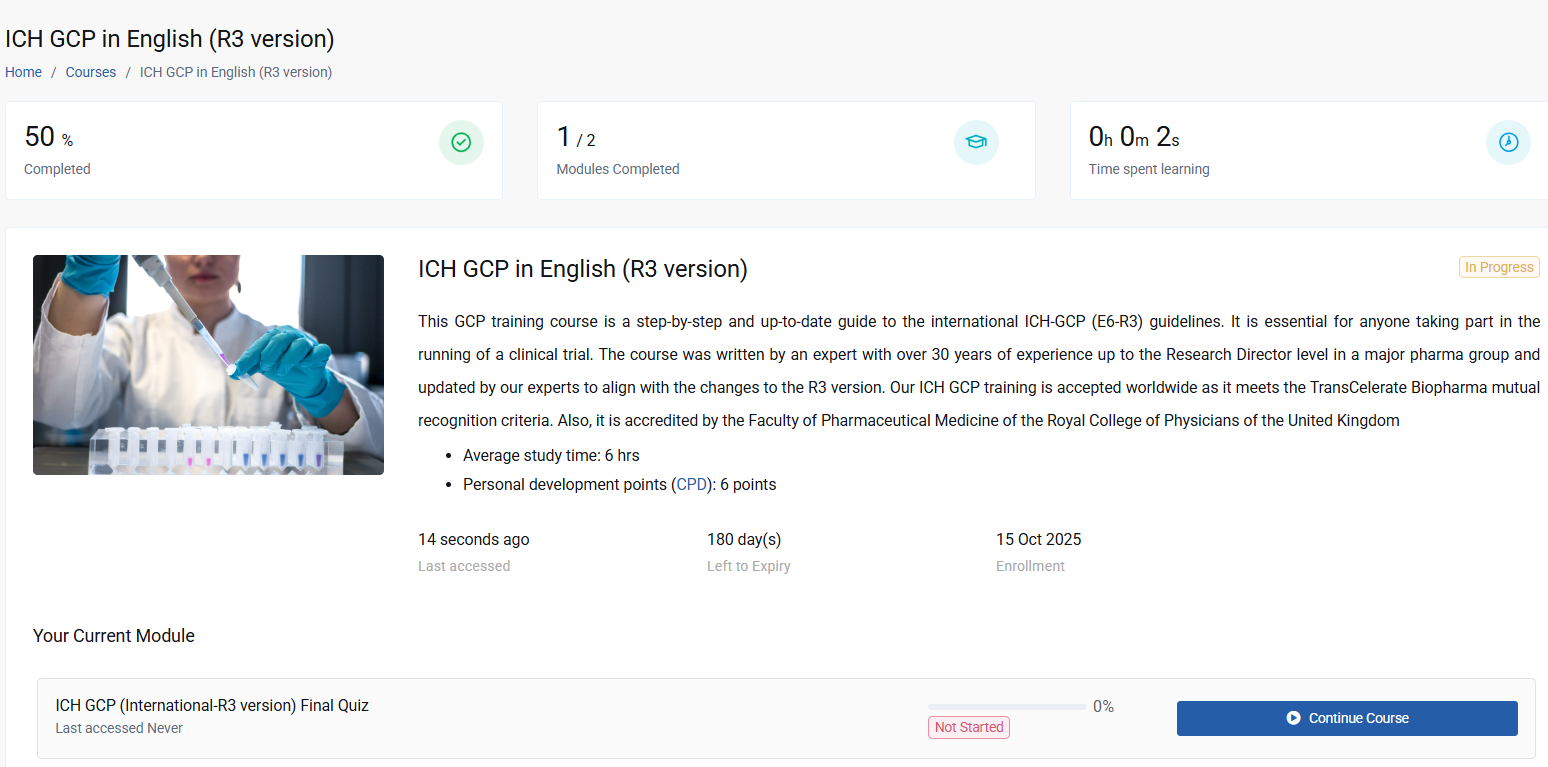I have finalised the demo for the ICH-GCP E6 R3 refresher course. Overall, I liked the content and the interface. I also want to thank Whitehall Train...
About
Rédigé par un expert avec plus de 30 ans d'expérience jusqu'au niveau de directeur de recherche dans un grand groupe pharmaceutique, ce cours de formation GCP couvre les lignes directrices internationales ICH-GCP (E6-R3) et répond aux exigences de formation pour que vous puissiez participer à des essais cliniques internationaux.
Course Syllabus
- L'histoire de GCP : Partie 1
- L'histoire de GCP : Partie 2
- L'histoire de GCP : Partie 3
- L'histoire de GCP : Partie 4
- Qu'est-ce que GCP ?
- Les principes de l'ICH GCP : Partie 1
- Les principes de l'ICH GCP : Partie 2
- Points d'apprentissage supplémentaires
- Documentation et contrôle des versions
- Assurance qualité (AQ)
- Ressources clés : Partie 1
- Ressources clés : Partie 2
- Introduction : Partie 1
- Introduction : Partie 2
- Introduction : Partie 3
- Introduction : Partie 4
- Introduction : Partie 5
- Introduction : Partie 6
- Introduction : Partie 7
- Introduction : Partie 8
- Introduction : Partie 9
- Responsabilités de l'autorité de régulation
- Responsabilités de la CEI
- Formulaires de consentement éclairé du sujet (ICF) Partie 1
- Formulaires de consentement éclairé du sujet (ICF) : Partie 2
- Composition, fonctions, opérations, procédures et dossiers
- Interactions de l'IEC avec les promoteurs et les chercheurs
- Introduction
- Responsabilités de l'enquêteur
- Qualifications et accords des enquêteurs
- Des ressources adéquates
- Soins médicaux aux sujets d'essai : Partie 1
- Soins médicaux aux sujets d'essai : partie 2
- Communication avec l'IRB/IEC
- Respect du protocole
- médicaments expérimentaux
- Procédures de randomisation et levée de l'aveugle
- Consentement éclairé : Introduction
- Consentement éclairé : la discussion sur le consentement
- Consentement éclairé : sujets qui ne savent ni lire ni écrire
- Consentement éclairé : mineurs et sujets « mentalement incapables »
- Consentement éclairé : sujets incapables
- Consentement éclairé : mise à jour du consentement
- Dossiers et rapports : Introduction
- Dossiers et rapports : dossiers du site d'étude
- Dossiers et rapports : mises à jour et modifications
- Dossiers et rapports : documents sources
- Dossiers et rapports : Informations financières
- Dossiers et rapports : le formulaire de dossier de cas
- Enregistrements et rapports : enregistrement des données des sujets
- Fin prématurée ou suspension d'un essai
- Rapports d'étape et rapports finaux par enquêteur
- Responsabilités de l'enquêteur
- Introduction : Partie 1
- Introduction : Partie 2
- Introduction : Partie 3
- Gestion de la qualité : Partie 1
- Gestion de la qualité : Partie 2
- Gestion de la qualité : Partie 3
- AQ et CQ (Assurance Qualité et Contrôle Qualité) : Introduction
- AQ et CQ (Assurance Qualité et Contrôle Qualité) : Procédures Opérationnelles Standardisées
- AQ et CQ (Assurance Qualité et Contrôle Qualité) : Accords et Contrats
- Organismes de recherche sous contrat
- Conception d'essai
- Gestion des essais : introduction
- Gestion des essais : gestion des données
- Gestion des essais : données électroniques
- Gestion des essais : tenue des dossiers
- Sélection des enquêteurs : introduction
- Sélection des enquêteurs : autorisations
- Sélection des enquêteurs : responsabilités
- Sélection des enquêteurs : rémunération
- Financement
- Notification/Soumission aux autorités réglementaires
- Confirmation de l'examen par l'IRB/IEC
- Informations sur l'IMP
- Fabrication, emballage, étiquetage et codage des produits expérimentaux : Partie 1
- Fabrication, emballage, étiquetage et codage des produits expérimentaux : partie 2
- Fourniture et manipulation de produits expérimentaux
- Accès aux enregistrements
- Traitement des données I
- raitement des données II
- Traitement des données III
- Traitement des données IV
- Traitement des données V
- Traitement des données VI
- Programmation statistique et analyse de données I
- Programmation statistique et analyse de données II
- Tenue et conservation des dossiers
- Vérification et inspection
- Non-conformité
- Fin prématurée ou suspension d'un essai : Partie 1
- Fin prématurée ou suspension d'un essai : partie 2
- Rapports d'essais/études cliniques
- Essais multicentriques
- Introduction
- Gouvernance des données - Partie 1
- Gouvernance des données - Partie 2
- Entretenir les aveugles
- Cycle de vie des données I
- Cycle de vie des données II
- Cycle de vie des données III
- Cycle de vie des données IV
- Systèmes informatisés I
- Systèmes informatisés II
- Systèmes informatisés III
- Systèmes informatisés IV
- Systèmes informatisés V
- Systèmes informatisés VI
- Systèmes informatisés VII
- Introduction
- Monitrice
- La visite de suivi : Partie 1
- La visite de suivi : Partie 2
- Vérification d'IMP
- Conformité au Protocole, aux Amendements, aux SOP et aux Orientations
- Vérification du consentement éclairé
- Le formulaire d'enregistrement de cas (CRF) et les documents sources
- Vérification des données du sujet
- Clôture de la visite de suivi
- Le rapport et le plan de suivi
- Gestion de la qualité - Surveillance centralisée
- Fraude et faute professionnelle : 1re partie
- Fraude et mauvaise conduite : 2e partie
- Introduction
- Effets indésirables, effets indésirables graves et réactions indésirables graves
- Événements indésirables graves
- SUSAR
- Événements indésirables présentant un intérêt particulier
- Rapports périodiques de sécurité
- Introduction
- Structure et contenu du protocole : Partie 1
- Structure et contenu du protocole : Partie 2
- Structure et contenu du protocole : Partie 3
- Introduction
- Structure et contenu de la brochure de l'enquêteur
- Présentations
- Archivage
- Documents à présenter avant l'étude
- Documents à présenter après les études
- Glossaire et abréviations
- Documents d'orientation de l'UE
- Documents d'orientation de l'ICH
- Documents d'orientation de la FDA américaine
- Impressions de cours GCP
- Liste mondiale des autorités compétentes
Our Certified Customers
Learner Rating & Reviews
Frequently Asked Questions
Good Clinical Practice (GCP) training is an essential educational program that equips researchers and clinical trial professionals with the knowledge of ethical and scientific standards crucial for conducting high-quality clinical trials. This comprehensive training covers the internationally recognized guidelines established by the International Council for Harmonisation (ICH).
The primary goals of GCP training are:
- Ensuring the protection of human subjects' rights, safety, and well-being
- Maintaining the integrity and reliability of clinical trial data
- Promoting consistent, high-quality practices across all aspects of clinical research
Our GCP course delves into these critical areas, providing learners with a solid foundation in the principles and practical applications of Good Clinical Practice.
For researchers interested in participating in clinical trials, GCP certification is a necessity.
For those who are simply interested in improving their understanding of the field, GCP certification is highly valuable due to its:
- Ensures compliance with international standards
- Enhances research credibility and quality
- Protects participant rights and safety
- Improves career prospects in clinical research
Our course not only provides certification but also equips you with practical skills to apply GCP principles effectively in your work.
GCP certification is essential for a wide range of professionals in clinical research:
- Clinical Trial Investigators: Principal investigators and sub-investigators responsible for trial conduct at research sites.
- Clinical Trial Staff: Including research coordinators, study nurses, and other site personnel involved in trial management.
- Sponsors and Contract Research Organizations (CROs): Those overseeing trial planning, initiation, and reporting.
- Regulatory Authorities: Officials who monitor and evaluate trial compliance.
- Institutional Review Boards (IRBs) and Ethics Committees: Members reviewing and approving trial protocols.
- Academic and Research Institution Staff: Ensuring adherence to international standards in institutional research.
- NIH-Funded Researchers: All investigators and staff involved in NIH-funded clinical trials.
Our course caters to this diverse audience, providing role-specific insights alongside core GCP principles. The course is also valuable for anyone looking to upskill their research abilities and improve their clinical trials operations.
This GCP training course covers the ICH-GCP (E6-R3) international guidelines and meets the training requirement for you to participate in international clinical trials. Multiple language versions are available. This GCP training course is a step-by-step and up-to-date guide to the international ICH-GCP (E6-R3) guidelines. It is essential for anyone taking part in the running of a clinical trial.
The course was written by an expert with over 30 years of experience up to the Research Director level in a major pharma group. Our ICH GCP training is accepted worldwide as it meets the TransCelerate Biopharma mutual recognition criteria. Also, it is accredited by the Faculty of Pharmaceutical Medicine of the Royal College of Physicians of the United Kingdom. Apart from English, the course is available in German, Bulgarian, French, Italian, Japanese, Polish, Portuguese, Russian and Spanish. We also produce regional versions of this course tailored to the specific regulatory frameworks in Australia, the UK, the US, France, Germany and Latin America.
This course features a clear and visually appealing format, allowing for easy cross-referencing to the ICH-GCP E6 document. It offers valuable insights into the practical application of Good Clinical Practice (GCP) based on the author's extensive experience. Furthermore, it is accredited by the Faculty of Pharmaceutical Medicine of the Royal College of Physicians of the United Kingdom and provides participants with the opportunity to earn 6 CPD points.
Yes, our GCP course is accredited by two industry-leading organisations:
- TransCelerate Biopharma Inc.: A nonprofit organisation collaborating with 20 major pharmaceutical companies. Their mutual recognition program is considered the gold standard in the field of clinical practice.
- The Faculty of Pharmaceutical Medicine at the Royal College of Physicians: The professional membership body for pharmaceutical physicians in the UK, known for setting rigorous standards for research since 1989.
These accreditations ensure our course meets the highest industry and academic standards, offering you a widely recognized certification.
Costs vary depending on the following factors:
- Accreditation: Is the course approved by official organisations, like TransCelerate?)
- Certification: Does the course meet the ICH requirements that allows researchers to participate in international clinical trials?
- Quality of content: Is the course up-to-date, and written by an expert?
- Access: How long are learners able to access the course?
Whitehall Training’s GCP course is £79 due to its:
- Accreditation: It is TransCelerate approved, and accredited by the Royal College of Physicians with 6 CPD points.
- Certification: The course enables users to participate in clinical trials, following the ICH E6(R3) guidelines.
- Quality of content: Our course is written by our Good Clinical Practice expert, Lucy Parker, who has over a decade of experience directing research across large research institutes such as the NHS.
- Access: To support the lifelong learning of our researchers, we provide lifetime access to our course resources.
Buying for a team? We offer 10% off orders of 5 licences at checkout. For discounts on larger orders, please get in touch with our team.




